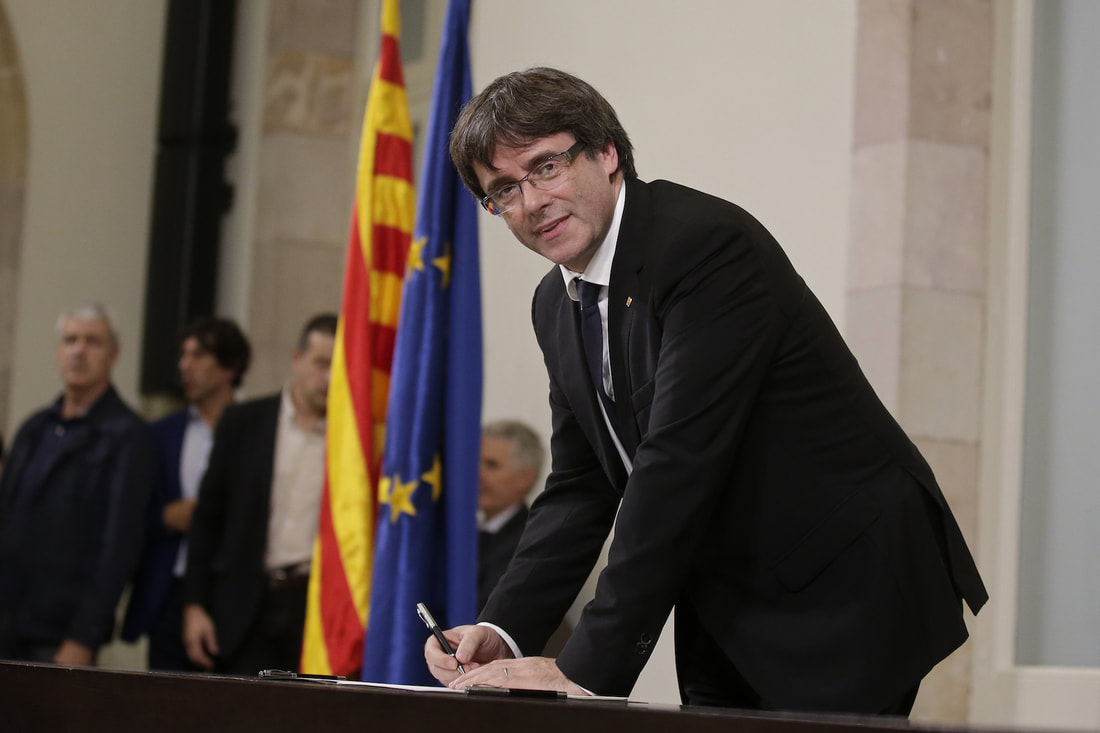|
Depending on which news outlet you read, you might get a different understanding of Puigdemont’s speech and whether Catalonia declared independence or not. For instance, the Los Angeles Times reports that he “stops short” of declaring independence, while El País says he “declared independence unilaterally.” The variations could give readers different impressions of what’s going to happen in Catalonia, or what measures the Spanish government might take in response. Below, compare how three outlets reported on Puigdemont’s speech, and then compare these to an official Catalan government translation of what he said. Do any of the media’s interpretations misrepresent his speech? El País (the English-language edition of the Spanish outlet): “Puigdemont declared independence unilaterally based on a ballot that lacked all basic democratic guarantees… But he immediately suspended it in search of dialogue.” Summary: Declared independence non-democratically and then suspended it. L.A. Times: “Catalonia’s regional leader stops short of declaring independence from Spain.” Summary: Did not declare independence. The New York Times: Puigdemont said “his region had earned the right to independence from Spain, but he immediately suspended the process to allow for talks with the central government in Madrid.” And he “stopp[ed] short of offering an immediate and outright declaration of independence.” Summary: “Earned” independence, didn’t declare it, and then suspended the independence process. Puigdemont’s actual wording (government translation): On the Catalan government website, his speech is subtitled “Declaration of independence by the President of the Catalan Government.” It reads: “…the Referendum Law establishes that [if a ‘yes’ vote wins, two days after the official result] the Parliament… ‘will hold an ordinary session to put into effect a formal declaration of the independence of Catalonia, its effects and agree the beginning of the constituent process.’ …as President of the Generalitat I take it upon myself to say, in presenting to you the results of the referendum before Parliament and our co-citizens, that the people have determined that Catalonia should become an independent state in the form of a republic…. [It’s] with the same solemnity, the Government and I myself propose that the Parliament suspends the effects of the declaration of independence so that in the coming weeks we may begin a dialogue without which it is impossible to arrive at an agreed solution.” None of the outlets we analyzed report that the Catalan government also signed a declaration that stated, “We constitute the Catalan Republic as an independent and sovereign State, of the rule of law, democratic and social.” That information may also help readers interpret the regional government’s position and its significance. Puigdemont’s speech itself may be somewhat confusing and the situation is complex. So it’s not surprising that news outlets had different interpretations of whether Catalonia declared independence, but the issue is they’re all presented as fact. So what should media do in cases where the news isn’t clear-cut? The most responsible reporting would include the exact wording of what the leader said. If outlets want to add their own interpretation, they could acknowledge it as such, rather than presenting it as fact.* This would provide readers with data-based information to help them draw their own conclusions about what happened. *The New York Times and Reuters include the pertinent sections of the speech for reference. El País’ coverage does not, and the L.A. Times’ includes quotes from the speech, but not the section about the declaration. Comments are closed.
|
Jens Erik GouldJens is a political, business and entertainment writer and editor who has reported from a dozen countries for media outlets including The New York Times, National Public Radio and Bloomberg News Archives
February 2018
Categories
All
|

 RSS Feed
RSS Feed